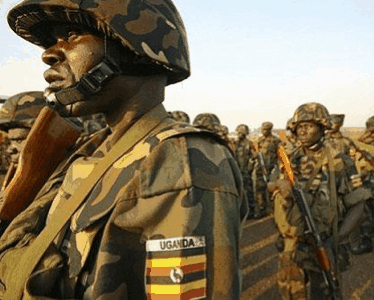S. Sudanese rebels accuse Juba of backtracking on UPDF withdrawal
January 14, 2015 (ADDIS ABABA) – South Sudan’s armed opposition faction led by former vice-president, Riek Machar, said their demand to withdraw Ugandan troops from the territory of the war torn country had already been signed by president Salva Kiir’s government since 23rd January 2014, accusing Juba and Kampala of backtracking on its implementation.

The top officials made the remarks in a press conference held at the South Sudanese embassy in Khartoum, where they attended a consultative meeting on peace in South Sudan sponsored by the Chinese government.
Information minister Michael Makuei Lueth said the rebels did not defeat the government in order to dictate terms. “They did not defeat us to dictate their own conditions. No rebel has the right to say expel the Ugandan forces,” he told reporters.
Government’s chief negotiator Nhial Deng Nhial regretted that the rebel group spoke about the withdrawal of the UPDF as a pretext to escape the implementation of the signed deals. He further said the matrix agreements of 11 November 2014 resolved the issue of the Ugandan troops as it provided for their pullout from South Sudan once a cease-fire is signed.
UPDF WITHDRAWAL SIGNED
The rebel group however said the demand to withdraw the Ugandan troops was already signed in the cessation of hostilities (CoH) agreement by the two warring parties, accusing the government of backtracking.
“The cessation of hostilities agreement which the two parties signed since 23 January 2014 calls on all allied foreign forces to withdraw from South Sudan per our demand. This has been recommitted to in the implementation matrix,” said Machar’s spokesperson, James Gatdet Dak.
“So what non-right are they talking about? Do they want to backtrack?” he inquired.
The opposition leader’s spokesperson said the leadership of the rebel faction was committed to the agreement and to pull out Ugandan troops and other foreign armed groups, saying the opposition faction had the right to demand for withdrawal of foreign troops from the country’s internal affairs.
He also said the government’s officials might have echoed the recent remarks by the Ugandan president Yoweri Museveni who declared rejection to withdraw his forces, saying this was a worrying trend in the peace process if Juba was to follow what Kampala said..
Dak also said the government sought military cooperation with UPDF because of “weakness and desperation for help in fighting the opposition group.”
“This is a military cooperation agreement mainly to fight us. Actually Ugandan troops were deployed around the capital, Juba, two days before the 15 December violence. Was this a coincidence or a premeditated violence?” he wondered.
Ugandan troops, he asserted, have been directly involving in the internal conflict, a move he said Kampala does not deny.
“Ugandan top officials are on record revealing and boasting about saving and protecting the regime in Juba. This is a fact they are proud to pronounce,” he said.
He said the rebel fighters had fought Ugandan troops in several battles in Equatoria and Upper Nile territories, adding that if it were not because of UPDF involvement the “response by freedom fighters would have landed them in Juba since January 2014 and the war would have been over.”
He further explained that Sudanese rebel groups allied to Juba also do much of the fighting against the South Sudanese rebels in Unity and Upper Nile states.
UPDF in January 2014 successfully stopped rapidly advancing opposition fighters after capturing the Jonglei state’s capital, Bor, and moving closer towards Juba.
The southern neighbour deployed thousands of troops backed by tanks and helicopter gunships. Their troops recaptured Bor from the rebel fighters and have continued to defend the national and state capitals.
Dak also dismissed the claim by the officials that UPDF was in the country to look for the LRA rebels, but however acknowledged that a small contingent was based in Western Equatoria state but was not intended to increase in size and redeploy to Juba, Bor and other areas to fight against South Sudanese.
(ST)
